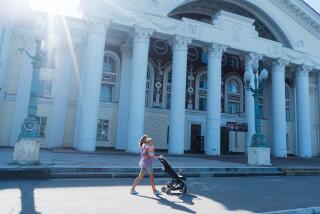Khrushchev ‘Loved to Build’--Praise From a Moscow Paper
MOSCOW — The late Soviet leader Nikita S. Khrushchev received a rare accolade in the press Thursday, one day after his successor’s name was all but wiped off the map.
The praise for Khrushchev, who was general secretary of the Soviet Communist Party from 1953 to 1964, came in a commentary by a local newspaper, Moscow Pravda, applauding the decision to remove the name of Leonid I. Brezhnev from a neighborhood district in Moscow, a city in the Tatar Autonomous Republic and squares in Leningrad and Moscow.
“One more step in the direction of restoring justice,” the newspaper declared, saying that Brezhnev talked about making Moscow a model city but did little to carry out the pledge. The article described the construction carried out during the Khrushchev era, when much of modern city was built.
“Khrushchev loved to build,” the article said, crediting him with the construction of a number of five-story apartment buildings that did much to ease the severe housing shortage of Josef Stalin’s time.
The former Cheremushky district in Moscow, named for Brezhnev until Wednesday’s action to erase the honor, was one of the areas in which those Khrushchev-era low-rise buildings were placed. While the apartments often required renovation, they contribute to a more pleasant atmosphere in the district.
The article said Khrushchev also deserves credit for construction of other landmarks of modern Moscow, such as the Kremlin Palace of Congresses, the Olympic stadium in Luzhniki Park, the Ostankino television tower and a downtown street of modern high-rise buildings, Kalinin Avenue.
“From his high post as leader of the party, he was engaged in city affairs every day,” the article’s author, Lev Kolodny, said.
In contrast to Brezhnev, however, the fiery Khrushchev never had anything in the Soviet Union formally named for him after he was ousted from the leadership on grounds that he was too erratic.
Until the current Soviet leader, Mikhail S. Gorbachev, came to power in 1985, it was rare to see Khrushchev’s name in print or see his face on television. He became a non-person and the public could not even see his grave because the cemetery where he was buried was closed to all but family visitors.
Now, however, Gorbachev himself has praised Khrushchev as the man who revealed Stalin’s crimes at the 20th Party Congress in 1956, and Khrushchev’s memory has been accorded a degree of respect.
More to Read
Sign up for Essential California
The most important California stories and recommendations in your inbox every morning.
You may occasionally receive promotional content from the Los Angeles Times.









